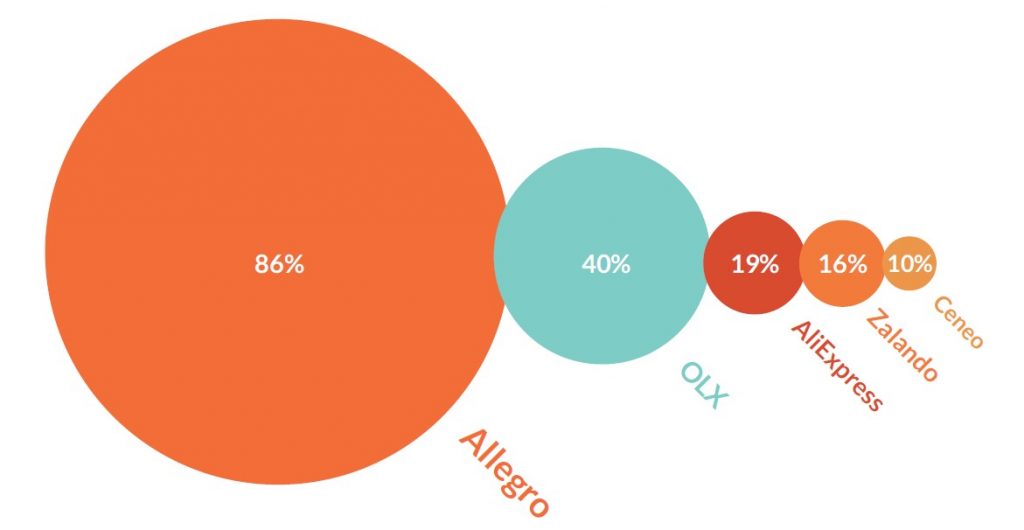Marketplaces and auction websites
- 20 July 2021

The two largest e-commerce companies in the world (Amazon and Alibaba) are marketplaces. Nowadays, the e-commerce world is shaped not by single online stores but by extensive shopping platforms, which are, right after Google, the main source of product information for millions of customers. In this article, we are going to take a closer look at marketplaces and try to find an answer to the simple yet valid question: Why are these platforms so popular?
When you take a look at the list of the 15 biggest e-commerce companies in the world, you will discover that almost half of them are marketplaces. As it happens, this list comprises Amazon (1st place), Alibaba (2nd place), JD.com (3rd place), eBay (10th place), Otto (11th place), and Zalando (13th place)[1].
AMAZON AND ALIBABA – WORLD E-COMMERCE LEADERS
Amazon is by far the most popular e-commerce website in the world. This company’s revenue only proves this statement. In 2020, Jeff Bezos’ company increased its revenue by 38% to 386 billion USD (a yearly increase of over $100 billion). Amazon reigns in America and Europe. When it comes to Asia, though, Alibaba Group is number one. This company manages two marketplaces:
- Alibaba (a B2B platform for wholesalers)
- Aliexpress (a B2C marketplace for individual customers who can purchase even a single piece/unit of the product they want to buy)
According to MacroTrends, Alibaba Group’s annual revenue for 2020 was 71.985 billion USD, a 28.2% increase from 2019[2].
Check our video about the TOP10 marketplaces worldwide:
It’s time to reveal the secret of marketplaces. And it is quite straightforward – this model has been known and used for centuries!
Marketplaces – returning to the roots of selling and buying
Today, marketplaces and auction websites are simply a modern representation of exactly the same way people used to trade in the past. Just like in the past, you had to go to the market or fair to buy everything you need, you do similarly today. The only difference is you do that online. It’s a simple solution that customers all over the world know and value for convenience. And just like it was in the olden days, digital marketplaces simply bring together people and companies that want to sell with people and companies that want to buy.
Both marketplaces and auction platforms operate within three basic models:
- B2B (Alibaba)
- B2C (Amazon, Zalando)
- C2C (OLX, Craigslist)
Of course, some of these platforms combine more than one model. For instance, OLX allows you to sell products both as an individual user (C2C) and as a company (B2C).
Interestingly, the popularity of this model goes far beyond online retail! There are marketplaces where you can find:
- Services (AirBnb)
- Information (Yelp)
- Investments (Kickstarter)
- Vendors and subcontractors (Upwork)
Online auctions
Many marketplaces (although it’s not a prerequisite) offer the possibility to bid on products. The idea behind this model is quite straightforward: The seller puts a specific product on sale and sets the minimal price they expect to get for it. The auction starts. Potential buyers bid on that product for some time (typically a few days). The winner buys the product for the auctioned price (of course, given that this price is higher than the minimal one set by the seller).
EBAY
It is the biggest marketplace that offers buying through online auctions and one of the worldwide forerunners of this online trade model. Ebay started its operations back in 1995 and although this platform has never become popular in some countries (e.g., Poland), it’s still a vital player in the international e-commerce market:
- It’s present in over 30 countries[5]
- In 2019, eBay had over 180 million users and offered over 1,3 billion listings[6]
- Remarkably, today over 80% of all items sold on eBay are new products
Ebay’s secret lies in two significant advantages:
- This platform is free to use for all buyers
- It protects both transaction parties in case of a fraud attempt
And yes, today, eBay is the biggest auction website, but by no means the only one. Take a look at some other examples[7]:
- Auction.com (primarily real estate auctions)
- Copart (vehicles and car parts)
- BidSpotter (corporate equipment)
- Sotheby’s (luxury items and collectibles)
- Allegro.pl (the biggest e-commerce website in Poland).
ALLEGRO – THE LARGEST MARKETPLACE AND AUCTION WEBSITE IN POLAND
Marketplaces are prevalent in Poland. In the recent E-commerce in Poland 2020 study, interviewees were asked about their spontaneous knowledge of e-commerce websites. Over 85% mentioned Allegro first.

Initially, Allegro was strictly an auction platform, inspired by American competitor eBay. In 1999, it was one of the very places on the Polish internet where everyone could sell and buy products from different categories at attractive prices. Today, this platform boasts that they have over 90 million products[3] and over 20 million users[4].
Other marketplaces
The popularity of the business model that has been made accessible thanks to marketplaces caused many companies all over the world to start their own platforms. And Facebook is the most recognizable example:
FACEBOOK MARKETPLACE
It’s a platform introduced by Mark Zuckerberg’s company back in 2016. FB Marketplace was made chiefly with individual customers in mind. Shortly after the implementation of this platform, Facebook informed in their press release: „Today we’re introducing Marketplace, a convenient destination to discover, buy and sell items with people in your community. Marketplace makes it easy to find new things you’ll love, and find a new home for the things you’re ready to part with.”[8]

And so today, FB Marketplace is used mostly by individuals wanting to sell items they no longer need, i.a., bikes, skis, furniture, clothes, and even cars and motorcycles. Of course, you will find B2C offers as well, as many companies use the Marketplace to promote their services and products.
Facebook Shops
However, online trade in the typical e-commerce model was never a goal for Facebook’s Marketplace. When it comes to online stores, FB is currently working on another solution – Facebook Shops. It’s a service for online stores wishing to offer their products on Facebook and Instagram. With FB Shops, sellers can:
- Add many products within one store
- Adjust the store’s layout
- Change the picture in the background
You can enter such a FB Shop via the company’s fanpage or Instagram profile. Also, Facebook announces the possibility to connect your Shop with e-commerce platforms and loyalty programs[9]. Currently, they are still working on this service, but you can already register your store. You will find all the necessary details here.
In this article, we focused on marketplaces and auction websites concerning their operations and popularity. By no means, though, we finished this fascinating subject. If you’re interested in marketplaces, we invite you to read more posts on Dealavo’s blog:
- Multichannel selling: Which products to sell and promote on the most important e-commerce platforms?
Price monitoring on marketplaces
Marketplaces are just perfect for price monitoring. Amazon, eBay, and Allegro constitute a vast source of knowledge of products you have in your offer, but also your competitors – their activity and prices. We covered that topic extensively in our piece about monitoring prices on e-commerce platforms. Thanks to that insight, you will be able to devise and implement an effective pricing strategy that will enable you to get more customers.
If you want to find out more or simply want to monitor prices on a chosen platform (i.a. Amazon, eBay, Google Shopping, and more), drop us a line today!
[1] https://finance.yahoo.com/news/15-largest-ecommerce-companies-world-100407574.html
[2] https://www.macrotrends.net/stocks/charts/BABA/alibaba/revenue
[3] https://dlakupujacych.allegro.pl/wygodne-zakupy/najwiekszy-wybor
[4] https://www.money.pl/gielda/allegro-liczba-firm-sprzedawcow-wzrosla-o-14-do-117-tys-w-i-pol-2020-r-6547572836059265a.html
[5] https://en.wikipedia.org/wiki/EBay
[6] https://www.oberlo.com/blog/ebay-statistics
[7] https://www.investopedia.com/best-online-auction-websites-5114546
[8] https://about.fb.com/news/2016/10/introducing-marketplace-buy-and-sell-with-your-local-community/
[9] https://about.fb.com/news/2020/05/introducing-facebook-shops/